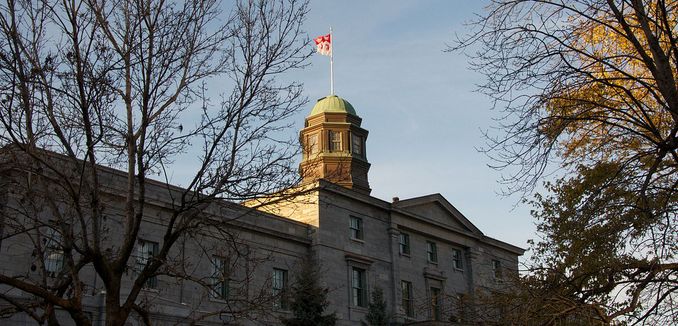McGill University’s student newspaper has come under fire after announcing that it no longer publishes articles that “promote a Zionist worldview,” the Jewish Telegraphic Agency reported Wednesday.
The policy was communicated in a statement made in response to a complaint about the paper’s coverage of anti-Semitism. “Upon reviewing this complaint, we found that it largely rested on the conflation of anti-Zionism and anti-Semitism, which we understand to be distinct from one another,” the statement read. “The Daily maintains an editorial line of not publishing pieces which promote a Zionist worldview, or any other ideology which we consider to be oppressive.”
According to the Daily, the paper has no Jewish editorial board members, though it acknowledged that “the broader Daily community contains Jewish voices.”
The Canadian Jewish News reported that McGill student Molly Harris had filed a complaint to the university’s Students’ Society about “a set of virulently anti-Semitic tweets” tweeted by a member of the Daily‘s staff and that a “culture of anti-Semitism” was blocking pro-Israel opinions from being published at the paper. Harris published an article in The Washington Post in August, in which she recounted a number of anti-Semitic and anti-Zionist incidents that occurred on campus, including one involving an on-campus publication. “When I asked if a student publication would write about instances of anti-Semitism on campus in its end-of-year issue, I was told that those instances were already covered in ‘mainstream Zionist media,’” she wrote.
“The McGill Daily’s refusal to give a platform to pro-Zionist commentaries has racist dimensions and xenophobic overtones as the viewpoints of Jewish students… and supporters of Israel (avowed Zionists) are deemed persona non grata,” Mike Fegelman, the executive director of the media watchdog group HonestReportingCanada, said in a statement. “Jewish nationalism should never be a forbidden topic in the McGill Daily for those who want to advocate and educate the masses about Zionism.”
The Daily’s decision was also slammed by McGill’s Hillel, which issued a statement on its Facebook page: “In addition to being a one-sided and incomplete view of the Arab-Israeli conflict, this position and the way The Daily came to adopt it is an egregious violation of the most fundamental journalistic ethics of truth/accuracy, independence, fairness/impartiality, humanity, and accountability.”
1969: Charles Krauthammer elected editor of McGill Daily
2016: McGill Daily bans articles with "a Zionist worldview"https://t.co/jjLKZKgTJb pic.twitter.com/8eaHnOkvEr— Hillel Neuer (@HillelNeuer) November 15, 2016
While Daily’s editors objected to “the conflation of anti-Zionism and anti-Semitism, which we understand to be distinct from one another,” the late Robert Wistrich, one of the world’s foremost experts on anti-Semitism, saw a connection. In a 2004 essay, Wistrich wrote:
Anti-Zionism and anti-Semitism are two distinct ideologies that over time (especially since 1948) have tended to converge, generally without undergoing a full merger. There have always been Bundists, Jewish communists, Reform Jews, and ultra-Orthodox Jews who strongly opposed Zionism without being Judeophobes. So, too, there are conservatives, liberals, and leftists in the West today who are pro-Palestinian, antagonistic toward Israel, and deeply distrustful of Zionism without crossing the line into anti-Semitism. …
Nevertheless, I believe that the more radical forms of anti-Zionism that have emerged with renewed force in recent years do display unmistakable analogies to European anti-Semitism immediately preceding the Holocaust. One of the more striking symptoms has been the call for a scientific, cultural, and economic boycott of Israel that arouses some grim associations and memories among Jews of the Nazi boycott that began in 1933. …
Much of the mobilizing power of “anti-Zionism” derives from its link to the Palestinian cause. Since the 1960s, the PLO has worked hard to totally delegitimize Zionism and the policy has largely succeeded: this anti-Zionism involves a total negation of Jewish nationhood and legitimate Jewish sovereignty in Eretz Israel, a denial of the link between Judaism and the land, or of the existence of the two Jewish temples in Jerusalem. …
Palestinian suffering and Arab “anti-Zionism” have helped to infect Europe with an old-new version of anti-Semitism in which Jews are rapacious, bloodsucking colonialists. The theme is that Jews were rootless, imperialist invaders who came to Palestine to conquer the land by brute force, to expel or “cleanse” it of its natives. They are the modern “Crusaders” with no legitimate rights to the soil – an alien transplant, absolutely foreign to the region. They succeeded only because of a gigantic occult conspiracy in which the Zionists (i.e., the Jews) manipulated Great Britain and subsequently America. This is a typically anti-Semitic narrative of which Hitler might have approved – widely believed around the world, even credited by millions of educated people in the West.
Despite the Daily‘s policy, the university’s student body has rejected recent attempts to single out Israel. A Students’ Society referendum in February on whether to support the Boycott, Divest and Sanction movement against Israel failed by 57-43 percent. The McGill student government determined in June that anti-Israel boycotts violated the school’s anti-discrimination policy.
[Photo: Guilhermeduartegarcia / WikiCommons ]




